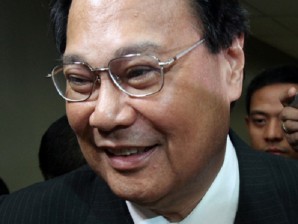Did impeached Chief Justice Renato Corona earn enough to acquire properties, which, the prosecution panel claimed, were unexplained wealth?
A day after being accused of delaying the proceedings, the defense panel on Tuesday went straight to the second impeachment article—Corona’s alleged failure to publicly declare his statements of assets, liabilities and net worth (SALNs)—and presented a key witness to testify on his sources of income.
Araceli Bayuga, a budget and disbursement officer of the Supreme Court, testified that Corona had received a total of P21,636,781.45 in salaries, allowances and other benefits, since he joined the tribunal in 2002 until last year.
Corona’s salaries from the same period amounted to a total of P5,872,859.82, the witness said under direct examination by the lead defense counsel, Serafin Cuevas.
Much of Corona’s earnings came from allowances and other benefits he received while sitting at the Presidential Electoral Tribunal, including such items as “productivity enhancement benefit, Christmas cash gift, additional Christmas cash gift (and) yearend cash gift.”
Corona also received allowances for “clothing, representation, and transportation” including “extraordinary and miscellaneous expense.” He likewise got longevity and “productivity incentive benefits.”
A summary of these salaries and benefits was contained in a certification issued by Bayuga as chief judicial staff officer of the cash collection and disbursement division of the Supreme Court’s fiscal management and budget office. Bayuga produced the certification in court as evidence for the defense.
“I reviewed and evaluated all the paid payroll pertaining to salaries, allowances and other benefits received by the honorable Chief Justice from 2002 up to 2011,” she said.
Income from 2002 to 2011
According to Bayuga, Corona’s annual salary began at P353,045 in 2002, increased to P485,100 in the next four years, before improving to P650,447.23 in 2010. Last year, the Chief Justice’s salary amounted to P1,147,301.77
The defense presented Bayuga’s testimony some two months after prosecutors paraded in media interviews information about Corona’s purported “45 properties.” Senator-judges later scolded them over the allegation, noting that only 24 properties were tackled in the actual impeachment trial.
Corona’s camp insisted that there were only five properties under his name. Among them were condominium units at The Bellagio and Bonifacio Ridge in Taguig City, The Columns in Makati City, Burgundy Plaza in Quezon City, and the house at Xavierville Subdivision, also in Quezon City.
In previous interviews, defense lawyer Ramon Esguerra said his camp had been preparing evidence on Corona’s allowances partly to prove that he had legitimate sources of income to afford the properties.
While examining Bayuga, Cuevas noted that the prosecution earlier alleged that there was no “alpha list covering the Chief Justice” from 2002 to 2005. The witness produced a copy of the alpha list wherein “the names of the official employees of the court and from whom taxes withheld were stated.”
Witness incompetent
Bayuga said she had personally brought the lists to the Bureau of Internal Revenue because “under revenue regulations, we have to submit (them).”
Private prosecutor Antonio Hernandez earlier objected to Bayuga’s testimony on the alpha list, saying she was “incompetent.” Senate President Juan Ponce Enrile, the presiding officer, overruled him.
Cuevas’ direct examination was relatively quick. But Hernandez asked to be allowed to cross-examine the witness today, a request Enrile promptly granted.
“This is the first time that we’re seeing these documents,” the private counsel told the court, referring to Bayuga’s certification and the alpha lists.
Senator Francis Pangilinan, a key ally of President Benigno Aquino III, later questioned why Bayuga was allowed to testify despite the Supreme Court’s February 14 resolution supposedly preventing its officials and employees from appearing in the impeachment court.
“My concern here is we now have a situation wherein the Supreme Court decides when it will honor our subpoena and when it will ignore our subpoena,” he manifested on the floor.
“The only check on the possible excesses of the Supreme Court is in this impeachment court. My fear is, now the only check is now being checked by the entity that is supposed to be checked.”
Subpoenaed earlier
But Enrile reminded Pangilinan that Bayuga had also been the subject of a subpoena issued upon the request of the prosecution. He said the witness complied and showed up at the Senate on February 1.
“So maybe, the matter that was the subject of her examination today, as well as then, is not considered confidential by the Supreme Court,” Enrile said.
Cuevas read a portion of the February 14 resolution, stating that “testimony on matters external to their (Supreme Court employees’) adjudicatory functions and duties may be compelled by compulsory processes.”
Bayuga was called as the second defense witness after Enrile announced that he had turned down a request by Corona’s lawyers to subpoena the chief prosecutor, Representative Niel Tupas Jr., and other congressmen, citing interparliamentary courtesy. In the same manner, he noted that he had also refused prosecution pleas to summon officials and employees of the Supreme Court, saying it was a coequal branch of government.
Bernas will not testify
Fr. Joaquin Bernas, a noted constitutionalist, said in a TV news interview he had not received an invitation to appear on behalf of the defense but added that he would have turned it down. He said that as a commentator, he did not wish to be identified with either the defense or the prosecution. With Cynthia D. Balana and Maila Ager
